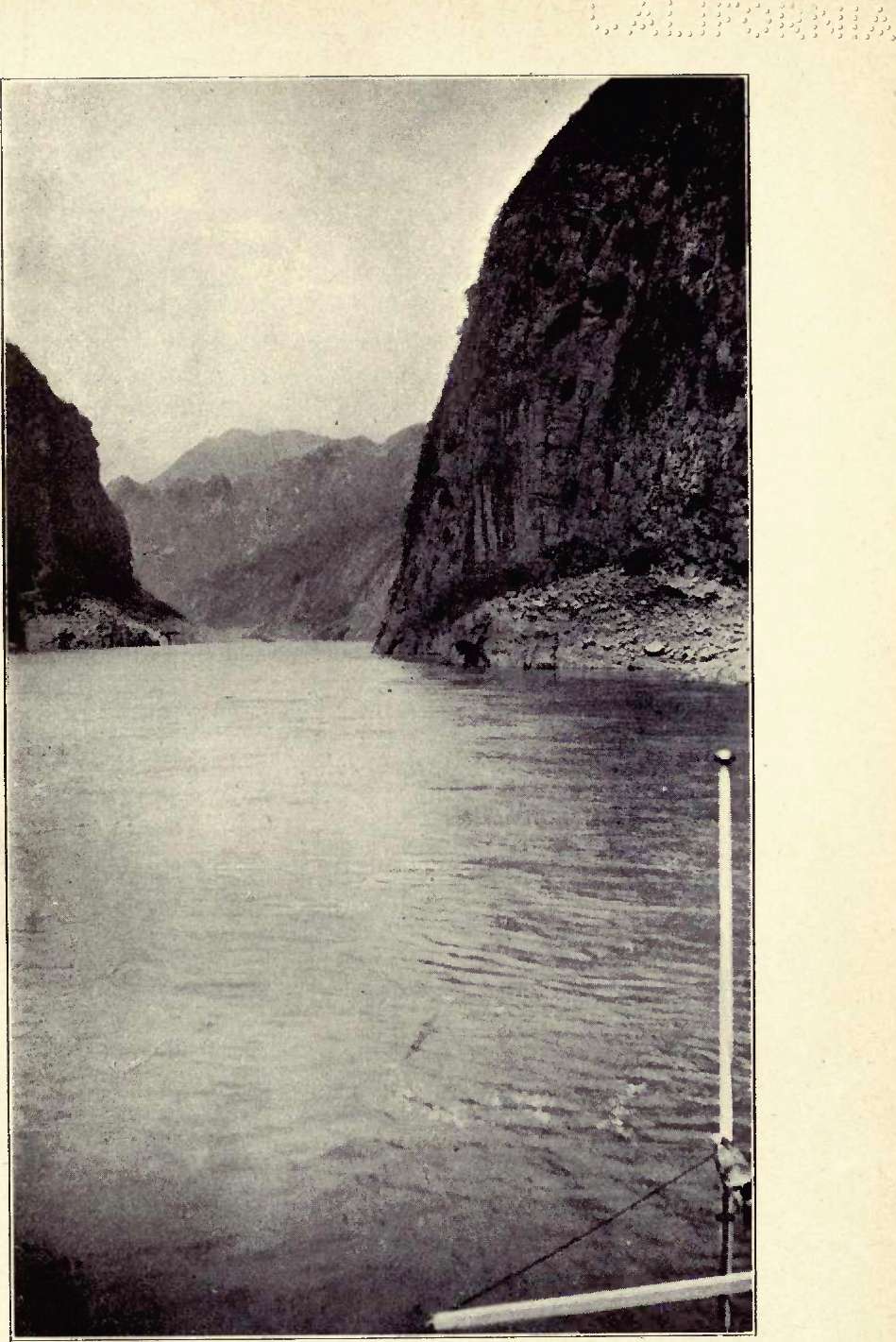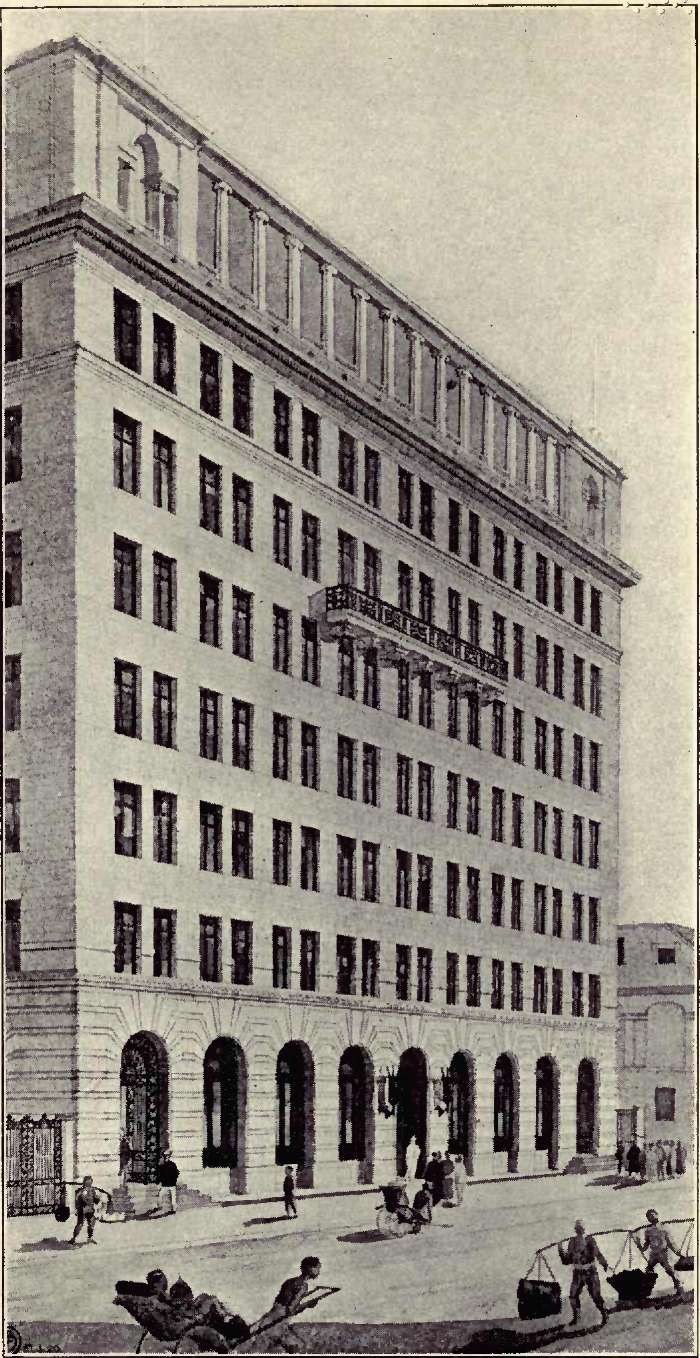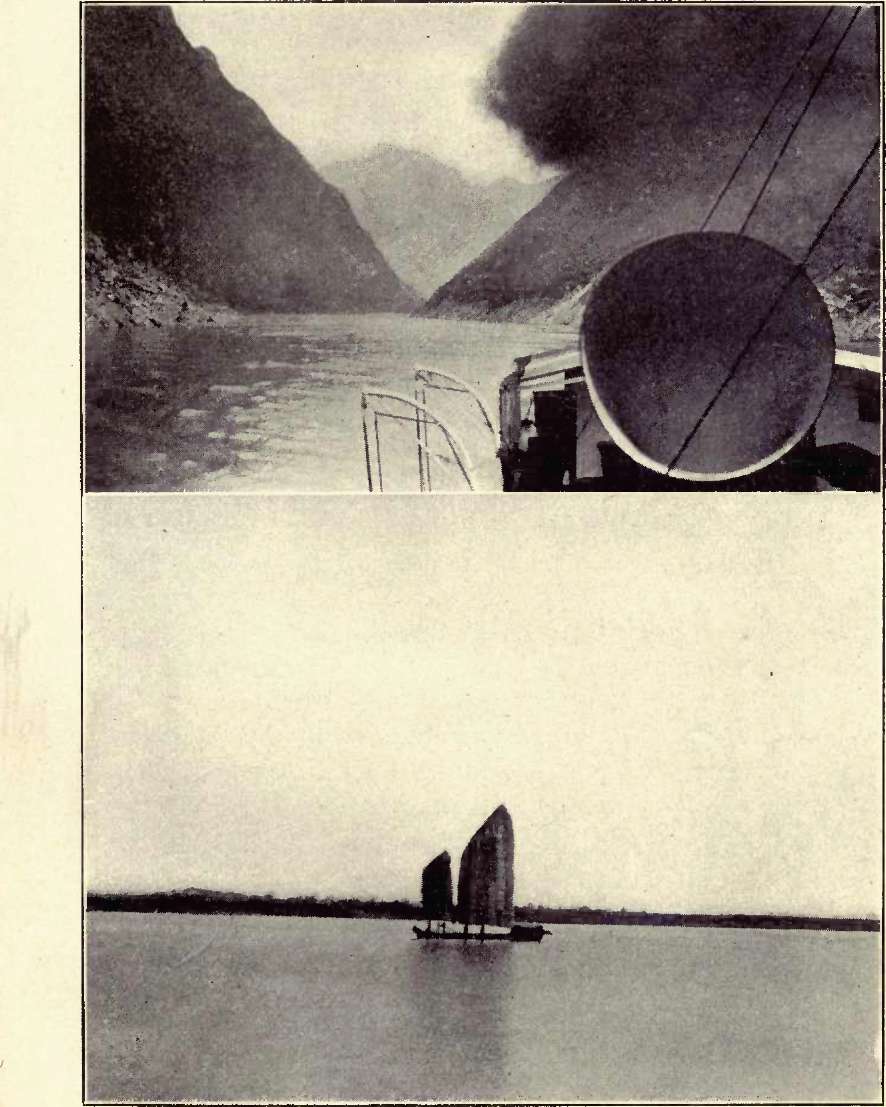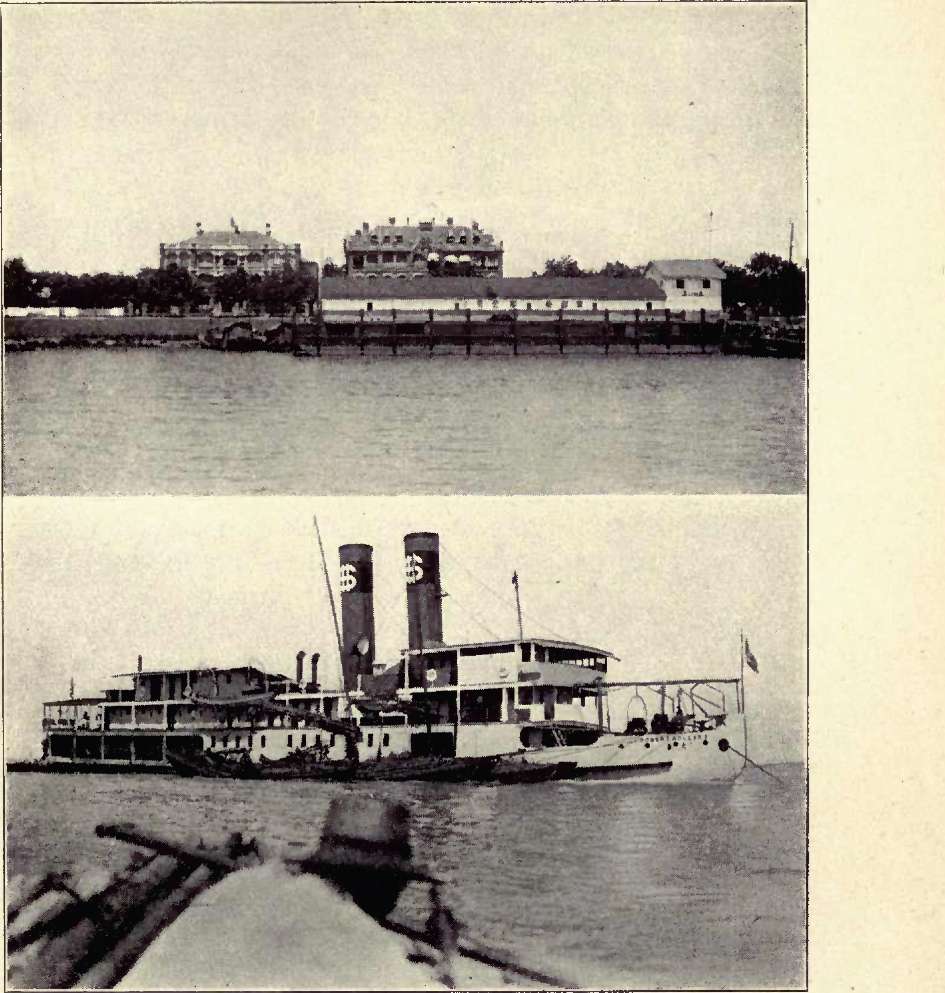|
We sailed from Hankow for Shanghai on the
steamer Long Woo. Like all the river steamers she is well fitted up for
first class passengers, and the food was all that could he desired. We
had a very pleasant passage. I
noticed at Kuikiang that the gauge showed the water to he 40 feet above
low water level, so it was encroaching upon the land that was not
protected by dikes or levees.
At noon we arrived at Shaiquan (Nanking)
and most of the passengers went by train to Shanghai. But I had writing
to do so we stayed on the boat, arriving in Shanghai at 10:00 the next
morning, so I got in nearly a full day's business.
July 1st we had a terrible tropical
thunderstorm, accompanied with torrents of rain. I had a meeting with
the Chinese head men of the village at our wharf at Pootung at which I
offered to build and equip a schoolhouse and pay all expenses the first
year, if they would provide the laud; they to take it over and run it
themselves after the first year. We selected a suitable piece of land
and they were satisfied and agreed to my proposal. I found there were
about sixty children of school age. and that none of them attended
school. This village is the result of our building a wharf, warehouses,
lumber yard, etc. The village started after we commenced to build, and
there is now profitable work for a great many men at one time. When we
had three vessels in port we employed from 600 to 700 men.
Just a few words about our wharf. It
fronts on the Wham-poo River and Pa Ling Ching creek, with a frontage of
1400 feet on the river, and can accommodate three large steamers at a
time. The wharf is one of the strongest wooden wharves I have ever seen;
a rail track on the front for a steam crane provides for handling heavy
lifts up to thirty tons.
The buildings are all of reinforced
concrete. We have two two-story warehouses, 80' x 300' and 100' x 400',
respectively, with an aggregate storage capacity of 40,000 tons; customs

A YANGTSE GOUGE SHOWING CLIFFS
examination sheds 80' x 450'; a very good
modern office,-"a power house that supplies the plant and vessels with
water and electric light, houses for the managers and men, a lumber yard
capable of storing six million feet of lumber, and plenty of ground for
open storage of coal up to 50,000 tons, and any other commodities that
don't require a roof over them. It is as complete a plant as one could
wish for, and provides the means for the rapid handling of our ships,
which is a great advantage. Our ferry steamer to Shanghai carries 23,000
passengers monthly.
A few days ago we had the privilege of
attending the dedication of the Young Womens' Christian Association
Building, which we erected to commemorate the death of our
daughter-in-law, Mrs. A. Melville Dollar, which occurred in Shanghai,
December 1918. It is a tine building. The lower part will be used for a
reception hall, and the upper story for bedrooms for the girls. We were
well pleased with what had been done. A Chinese lady delivered an
excellent address in English.
SHANGHAI
I inspected our new Shanghai building,
which is on Canton Road, near the Bund. It has a frontage on Canton Road
of about 165 feet, with alleyways on three sides. It is a Class A
building of reinforced concrete, seven stories high and 1S intended for
a first-class office building; plenty of light is provided for each
room. We will use part of the lower floor for a shipping office, the
balance of the floor will be occupied by a bank. Our main offices will
occupy the entire upper floor. It is centrally located and will make a
good home for our Chinese business.
This makes me think back twenty years,
when we sent to China our first steamer, the M. S. Dollar. The result of
that voyage was a loss. This convinced me that if we hoped to' make a
success of this trade we must have an organization on the ground. So I
made a trip and carefully looked over the field, and opened an office in
one small room on Szechuen Road. This was certainly starting in on a
very small scale. This is my ideal—start on a small scale and work up
from a sure foundation. We moved several times in order to get larger
quarters, until we landed in our present offices, which we have
completely outgrown. Hence, the necessity for moving into larger
quarters in our new office building when it is completed in October.
Our Shanghai office was our first in the
Far Fast. Now there are eleven of them, and each one seems to have
plenty to do. The same progress has also been made in America. Twenty
years ago we only had the San Francisco office; now we have five others.
For all this I have absolutely no reason for self-glorification, but
have to thank a good providence that has permitted such success.
HONG KONG
After seeing the great progress that
Shanghai was making I must say that I was very much disappointed in the
looks of this city. It is certainly going backwards, and it does not
resemble the busy, hustling, pre-war city. I was very sorry to see that
they have never been able to recover from the effects of the expulsion
of the Germans. It is to be hoped that this seaport, that once stood
second of all the seaports in the world, in point of ships' tonnage
entering and clearing, will soon be able to recover from the effects of
the war. Kowloon appears to be about holding its own, but is very quiet
compared with pre-war times.
I never saw so few ships in the harbor as
at this time. I did not have time to go to Canton, so cannot report on
Conditions there, but I imagine Hong Kong's dullness would be reflected
in Canton, as to a great extent Hong Kong depends on the commerce of
Canton and tributary rivers. Except for finishing up old work on hand,
the shipyards appear to be on the eve of very dull times. When we take
into consideration that one-third the ships of the world are laid up, it
goes without saying that only one-third the repairs are necessary.
MANILA
On arrival at this port, it certainly
looked deserted, as only a very few ships were lying at anchor, and not
one at any of

OUR OFFICE BUILDING AT SHANGHAI
the docks. The Philippines, like all
other countries, were hard hit by the slump after the war, and Manila,
being the great commercial center, was hardest hit of all. But m
addition to the commercial depression, came government financial
troubles. The Philippine National Bank failure was disastrous; the stock
is practically owned by the Government, and from accounts we hear on the
streets, the capital has completely disappeared. Several of the high
officials have been arrested for stealing, and if we would believe half
the stories we hear, it has been systematically looted. Mr. E. W. Wilson
has tackled a big job in trying to pull it through. It appears to have
been run by politicians and their friends for their personal benefit. It
is to be hoped that it will not turn out half as bad as is reported,
though that will be bad enough.
The Government mismanagement during the
last four years has put the country in debt; all public works have been
suspended ; roads have gone out of repair, and an era of wreck and ruin
has taken the place of Governer Forbes' energetic and good management.
The management is now entirely in the hands of the Filipinos. During the
former regime there was always a surplus in the treasury and great
improvements were to be seen going on everywhere. Since then the taxes
have been doubled, practically all work suspended; money is all gone and
a big debt has accumulated. A proper question would be, "Where has all
this money gone?" The only answer that can be made to that question is,
that it must have gone into the pockets of hungry politicians. As an
illustration: On entering the harbor I tried to locate the dock that the
Pacific Mail was on the eve of starting eighteen months ago; also the
great Government pier we have heard so much of, but neither was visible.
At that time, a year and a half ago, I
looked at the rein forced piles they were making, and all the
preparations under way. Now I find the conditions required by the
Government prevented the Pacific Mail from going ahead, and that the
Government pier was in the same condition as when I left— nothing really
accomplished, expenses have been kept up all these eighteen months. The
Jones' bridge was well advanced at that time; now they claim they need
$260,000 to finish it. I only cite these conditions as otherwise it
would he impossible to believe what I have written of the terrible
financial straights. The leaders who have brought about this state of
affairs are clamoring for independence. What they did when they had a
free hand should he sufficient to convince the world that they are
utterly incapable of managing their own affairs. It is to be hoped that
when they get the money Congress has authorized, that it will be put in
charge of someone who will see that it is expended in a proper manner.
The Chamber of Commerce gave me a
complimentary luncheon at which every seat was taken, and when I spoke,
all standing room was occupied. The president, Captain Heath, made some
very complimentary remarks about what I had done. The following is what
one of the papers had to say of my remarks.
PRESTIGE GOES IF ISLANDS
ARE FREED
"Robert Dollar, 'Grand Old Man' of the
Pacific commerce, who spoke at the American Chamber of Commerce luncheon
at noon, was introduced by Captain Heath, who made a few facetious
remarks about business men liking to hear a Dollar talk, and spoke more
seriously of the important role played by Captain Dollar for the last
twenty or thirty years in developing Pacific commerce. He reminded the
members that Captain Dollar was seventy-two years old.
"Captain Dollar spoke briefly on a number
of topics. He said when he left the States that the finances of the
country were on an absolutely sound basis. The only fly in the ointment
he said was the attitude of the labor unions, which have decided to
accept no reductions in war-time wages. So long as the unionists persist
in that attitude, said Captain Dollar, effective competition with other
nations is absolutely impossible.
"The speaker told of how astounded he was
at the Fourth of July celebration at the American Consulate at Shanghai
several weeks ago. lie said that there were three times as many
Americans in Shanghai now as there were three years ago. This is very
encouraging, he said, although they have

Upper—VIEW OP A GORGE FROM STEAMER
Lower—A JUNK ON THE YANGTSE
their troubles at present just as they
have in the Philippines. The Dollar Company has a line of ships going
1600 miles up the Yangtse River now, opening up a country of 70,000,000
people. This means something to the Americans in the Philippines,
claimed the Captain, for there is a community of interests among all the
Americans in the Far Fast.
"Shipping all over the world is in a bad
condition. There is a tonnage of 15,000,000 over and above the tonnage
of the world at the beginning of the war, and business has decreased.
About half the tonnage of the world is laid up. 'When there was lots of
business and not enough shipping, we shipping men, said the Captain,
'could tell you where to get off," and could charge whatever rates we
pleased. But now, as there are more ships than there are cargoes, you
can tell us where to get off—and we are getting off too, I can tell
you,' he said sadly. 'I do not expect much improvement in the world
business situation until 1922/''-
"Captain Dollar criticised the Shipping
Board, saying that there is not a shipping man on it; three are lawyers,
one a newspaper man, and the rest are politicians.
'^Captain Dollar operates both British
and American ships. He said he cannot use American ships on certain runs
where he does use British ships because of certain harmful laws. No laws
have been introduced in Congress to benefit shipping, but many to harm
it. Things do not look very hopeful.
"'There is no use in stirring up
animosity over the trade of the Far Fast,' said the Captain. 'The best
friends I have are competitors of mine.'
"Captain Dollar believes that if
independence were given to the Philippines that they would be in trouble
several months afterwards. He wants America to adopt a fixed policy over
here. He wants America to tell the world what it is going to do over
here and then do it. He said he did not know what the Wood-Forbes report
was going to be but that he-was sure it was going to be right, and that
it was up to the United States to follow up the mission's
recommendations, whatever they are to be.
"'The opportunities for American commence
in the Far East are gigantic—inconceivable,' said Captain Dollar, 'but
if we let the Philippines loose, I don't see how we are to retain our
prestige in the Orient. America wants a share in the commerce of the Far
East, a fair share. Perhaps I won't live to see it, but I hope I may.
Captain Heath gave you my age. That was my age five years ago.'
"After Captain Dollar's speech and long
applause. Captain Heath read an Associated Press cable from Iloilo in
which General Wood is reported to have said, 'I am a soldier of the
Republic, and 1 go where I am ordered. I am too old to change.' The
reading of this dispatch was followed by continued cheering. When the
tumult had somewhat died down. Captain Dollar rose and said, 'We all
hope he will never change'."
ILOILO
It is ten years ago since I last visited
this town. At that time the Government under Governor Forbes was
improving the roads, the harbor, and the town generally; building a
custom house; also a sea wall along the city side of the river from the
custom house to the entrance of the river, to make the depth of water
twenty-six feet at low tide. They went along with the work until ;t got
into the hands of the Filipinos, when all work was stopped. The building
is about half completed, and the depth of water is only eighteen feet.
The custom house is in use but neither it nor the grounds have ever been
finished; roads have become ruts; and automobile roads that were once
the equal of those of any country, have been allowed to go to wreck and
ruin. It is out of my line to write tales of woe like this, so I will
stop, not that I have exhausted the subject, but it is displeasing to
me.
July and August are bad months for big
vessels to lie ia the outer harbor on account of wind squalls, rain and
typhoons. This time we got our share of them and lay there waiting for
four days, and for three days we could not get ashore. This place has
every appearance of becoming a great sugar shipping port if the harbor
is improved; if not, then various small ports w ill spring up.

Upper—OUR^'HULK AT HANKOW
Lower—STUAMEE "ROBERT DOLLAR II" |

